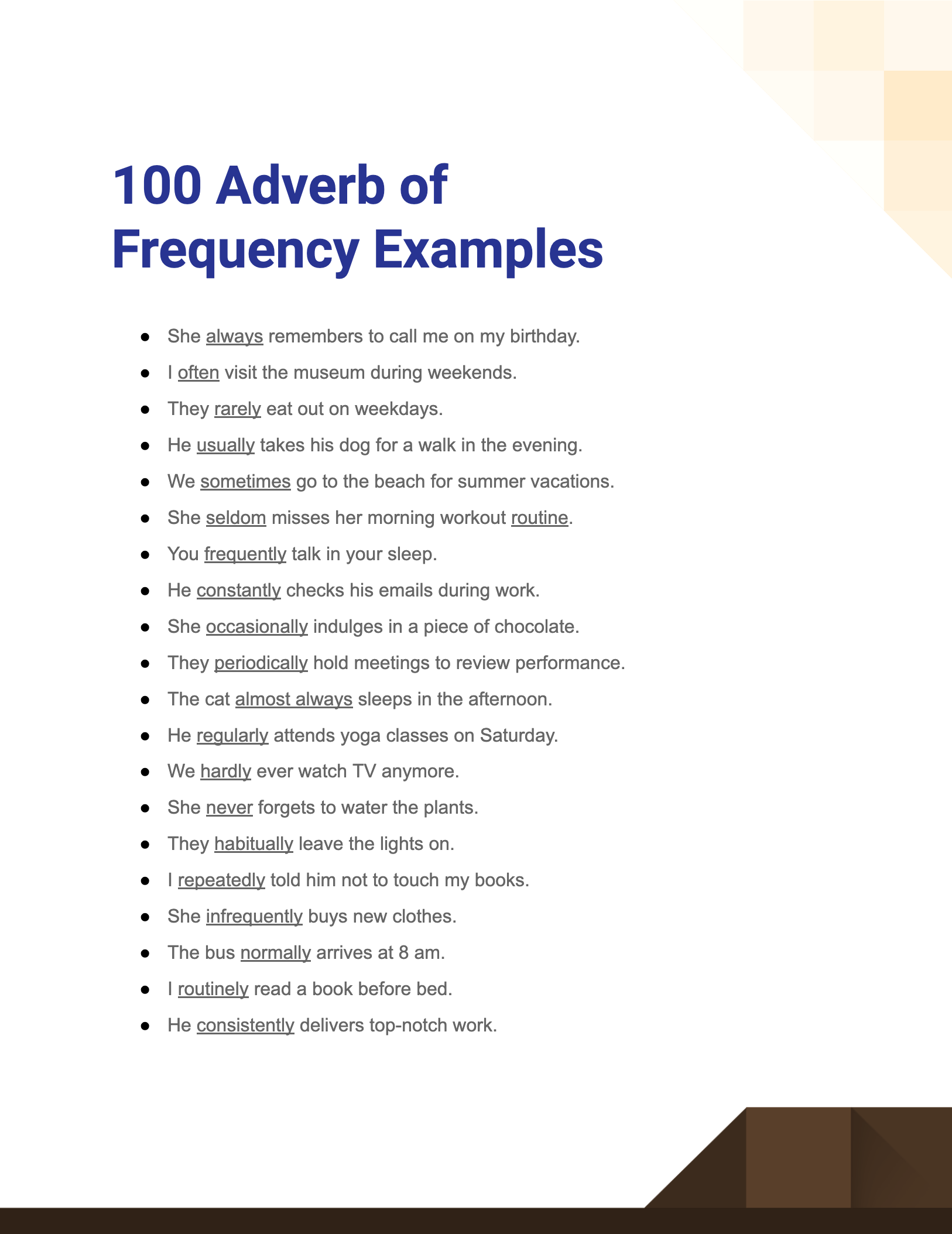99+ Adverb of Frequency Examples
Adverbs of frequency are essential components of the English language, detailing how often an action occurs. From “always” to “rarely,” they give rhythm and clarity to our sentences. Understanding their correct usage not only enhances communication but also enriches content quality. Whether you’re a budding writer or an ESL learner, mastering these adverbs can elevate your language skills. Dive into adverb examples, expert usage tips, and insightful tricks to ensure your sentences always hit the mark with the perfect frequency.
What is an Adverb of Frequency? – Definition
An adverb of frequency is a word that tells us how often an action takes place. It describes the regularity or frequency of a particular event or action.
What is an example of an Adverb of Frequency?
A prime example of an adverb of frequency is “always.” When we say, “She always arrives on time,” the word “always” tells us that the action (arriving on time) happens every time without fail. It indicates a 100% occurrence of the event.
100 Adverb of Frequency Examples

Unlock the power of language by mastering adverbs of frequency. These vital words punctuate our sentences, offering insights into the regularity of actions. Whether an event happens “always” or “rarely,” these adverbs give listeners and readers a clearer picture. Dive into 100 distinct examples below and enhance your linguistic flair.
- She always remembers to call me on my birthday.
- I often visit the museum during weekends.
- They rarely eat out on weekdays.
- He usually takes his dog for a walk in the evening.
- We sometimes go to the beach for summer vacations.
- She seldom misses her morning workout routine.
- You frequently talk in your sleep.
- He constantly checks his emails during work.
- She occasionally indulges in a piece of chocolate.
- They periodically hold meetings to review performance.
- The cat almost always sleeps in the afternoon.
- He regularly attends yoga classes on Saturday.
- We hardly ever watch TV anymore.
- She never forgets to water the plants.
- They habitually leave the lights on.
- I repeatedly told him not to touch my books.
- She infrequently buys new clothes.
- The bus normally arrives at 8 am.
- I routinely read a book before bed.
- He consistently delivers top-notch work.
- Birds customarily migrate during this season.
- The shop rarely ever offers discounts.
- She sporadically donates to charity.
- We typically have dinner at 7 pm.
- He incessantly talks about his adventures.
- The alarm unfailingly rings at 5 am.
- She mostly reads fiction novels.
- I continually find her notes in my books.
- The sun always rises in the east.
- We often forget how beautiful nature is.
- She seldom wears makeup.
- I regularly donate blood.
- The teacher constantly emphasizes the importance of hard work.
- She occasionally skips breakfast.
- The train usually runs on time.
- They periodically switch off their phones to detox.
- I rarely drink soda.
- He habitually grinds his teeth at night.
- The birds consistently gather around the feeder.
- They sometimes cancel the class if it rains.
- She often brings cookies to the office.
- I never miss an episode of my favorite show.
- He always ties his shoes in a double knot.
- The mail typically arrives in the afternoon.
- She rarely complains about her job.
- We frequently visit our grandparents during the holidays.
- He seldom drinks coffee after 5 pm.
- The computer automatically updates software.
- She sporadically wears glasses when reading.
- We usually take a walk after dinner.
- He constantly fidgets when he’s nervous.
- The event annually attracts thousands.
- They regularly hold concerts in the park.
- She sometimes forgets where she left her keys.
- Birds normally sing in the morning.
- We occasionally order pizza on Fridays.
- He rarely uses social media.
- The clock unfailingly chimes every hour.
- We often underestimate our potential.
- She repeatedly checks her reflection in the mirror.
- The tree seasonally sheds its leaves.
- I usually have tea in the evening.
- He seldom takes a day off.
- The festival is biennially celebrated.
- They never argue in public.
- She constantly hums while working.
- We periodically clean the garage.
- The moon generally rises at night.
- He regularly volunteers at the local shelter.
- She occasionally dyes her hair.
- I rarely eat spicy food.
- The play is annually performed in the theater.
- They always rely on facts.
- I sometimes meditate in the morning.
- He usually jogs in the park.
- We frequently have family gatherings.
- The phone automatically switches to silent mode in meetings.
- She seldom eats junk food.
- They regularly practice their musical instruments.
- I consistently choose the same flavor of ice cream.
- He rarely ever forgets a face.
- The newsletter is quarterly distributed.
- We typically avoid crowded places.
- The flowers seasonally bloom.
- He never neglects his duties.
- We often share memories from our childhood.
- She always brings a gift when visiting.
- I occasionally indulge in a day off.
- He seldom oversleeps.
- The bills automatically get deducted from my account.
- We periodically take breaks during work.
- She consistently maintains a journal.
- The stars usually shine at night.
- They often discuss their future plans.
- I never go to bed angry.
- She always thanks everyone.
- The conference is biannually organized.
- We sometimes forget the power of gratitude.
- He usually finishes work by 6 pm.
- The exhibition is annually held in the city center.
Adverb of Frequency Examples in Sentences
Adverbs of frequency seamlessly incorporate into sentences, illuminating the regularity of actions or events. When we read or listen, these adverbs subtly cue us to the occurrence rate of the described action. Here are 10 unique adverb in sentence examples:
- The library mainly opens at 9 am on weekdays.
- We quarterly hold team-building events.
- She sporadically buys vintage records.
- The meteor shower is yearly visible in August.
- They biannually take a major vacation.
- He invariably reads the newspaper at breakfast.
- The exams are semiannually scheduled.
- I intermittently fast on weekends.
- They continuously played music throughout the party.
- She weekly organizes her desk.
Adverb of Frequency Exercise Examples
Exercises with adverbs of frequency challenge language learners, helping to instill their correct usage. Crafting sentences with these exercises can aid in understanding their application. Here are 10 exercise examples:
- She ___ (sometimes/never) eats ice cream at night.
- They ___ (always/rarely) visit the zoo on Sundays.
- He ___ (usually/hardly) skips his morning routine.
- The alarm ___ (always/quarterly) goes off at 6 am.
- We ___ (annually/sporadically) host a big family reunion.
- The flowers ___ (daily/yearly) get watered.
- She ___ (sometimes/never) ignores her phone calls.
- I ___ (weekly/biannually) attend the gym.
- They ___ (always/seldom) have dessert after dinner.
- The meeting ___ (rarely/quarterly) lasts more than an hour.
Adverb of Frequency Examples with Answers
Using adverbs of frequency in exercises aids in reinforcing their significance, but providing answers aids in comprehension and clarity. Here are 10 examples with their answers:
- They seldom watch movies late at night. (Answer: seldom)
- The park is yearly closed for maintenance. (Answer: yearly)
- She daily writes in her diary. (Answer: daily)
- We occasionally splurge on fine dining. (Answer: occasionally)
- The dog never barks at the mailman. (Answer: never)
- The garden is weekly tended by a gardener. (Answer: weekly)
- I usually opt for a black coffee. (Answer: usually)
- They monthly pay their rent on the 1st. (Answer: monthly)
- She frequently changes her hairstyle. (Answer: frequently)
- We generally avoid fried foods. (Answer: generally)
How to Use the Adverb of Frequency?
Adverbs of frequency are words or phrases that describe how often something happens. Here’s a step-by-step guide on how to correctly use them in sentences:
- Identify the Verb: Every sentence contains a verb, an action word. Pinpoint it first. For example: She _____ (drink) coffee.
- Choose the Adverb: Depending on how often the action takes place, select the appropriate adverb of frequency. For example: always, usually, often, sometimes, rarely, never, etc.
- Placement:
- For most verbs: Place the adverb of frequency before the main verb. Example: She often drinks coffee.
- For the verb ‘to be’: Place the adverb of frequency after the verb. Example: He is always late.
- For modal verbs such as can, will, must: Place the adverb of frequency after the modal verb. Example: She can sometimes visit us.
- Negative Sentences: When forming negative sentences, put the adverb of frequency before the negative part. Example: They rarely don’t attend the meetings. Although such sentences are correct, they may sound awkward. A better structure might be: They rarely attend the meetings.
- Questions: In questions, the adverb of frequency goes after the subject. Example: Do you often visit the museum?
- Frequency Phrases: Longer adverbs of frequency, like “once a week” or “every other day,” usually go at the beginning or the end of the sentence. Example: I go to the gym once a week.
Tips for Using Adverb of Frequency
- Understand Their Meaning: It’s essential to know what each adverb of frequency means to use it correctly. For example, “always” means 100% of the time, while “rarely” means almost never.
- Vary Your Vocabulary: Instead of overusing a few common adverbs like “always” and “sometimes,” delve into richer vocabulary like “occasionally,” “frequently,” or “seldom.”
- Avoid Double Negatives: Using negative adverbs with negative verbs can lead to confusion. Instead of saying, “I don’t never go there,” say, “I never go there.”
- Keep It Natural: While grammatical rules provide a foundation, language is also about natural flow and rhythm. If a sentence feels overly complicated, try restructuring it.
- Listen and Learn: Engage with native speakers or consume media in English to understand how adverbs of frequency are used in natural conversation.
- Practice: Like all aspects of language, the more you use and practice with adverbs of frequency, the more comfortable you’ll become. Write sample sentences or create scenarios using different adverbs to test your understanding.
- Avoid Ambiguity: Some adverbs, depending on placement or context, might create ambiguity. Ensure the intended frequency is clear to your listener or reader.
- Frequency vs. Duration: Remember, adverbs of frequency describe how often something happens, not how long it lasts. Don’t confuse the two.
By understanding and practicing with adverbs of frequency, you can make your communication more precise and enrich your language skills.



